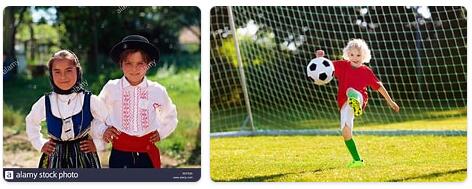Yearbook 2016
Portugal. Perhaps the most important event of the year was not political, it was sporting: July 10 won the Portuguese national team for the first time European football men’s soccer, and the day after, tens of thousands of fans celebrated the team, with Cristiano Ronaldo in the lead, on his return to Lisbon.
The current population of Portugal is 10,196,720. The January presidential election was won by 67-year-old lawyer Marcelo Rebelo de Sousa with about 53% of the vote. Independent left candidate Antonio Sampaio came in second place in the election but with just 22% of the vote. The presidential post in Portugal is of a ceremonial nature, but it is after all the president who appoints the prime minister and who can also dissolve parliament in a crisis.

During the year, the European Commission put pressure on Portugal’s new left government to lower its budget deficit and growth forecasts. This is so that the country’s state budget will fall within the EU regulations. It was later announced that both Portugal and Spain do not have to pay EU fines for their high budget deficits. However, Portugal must be able to reduce its budget deficit to 2.5% already during the year.
Prime Minister António Costa announced in February Sweden, Italy, Austria and Greece that Portugal would like to receive an additional 5,000 migrants, in addition to the 4,500 allocated under the quota system. The country has a low birth rate, and in the last four years, half a million people have left the country, which is therefore in great need of labor, including agriculture. In August, Prime Minister Costa Sweden visited and discussed the refugee issue with Prime Minister Stefan Löfven.
In August and September, fierce forest fires raged around Portugal; Thousands of firefighters and military were called in for the extinguishing work, which was made difficult by heavy winds.
In October, Portugal’s former Prime Minister António Guterres was appointed UN Secretary General following the departure of Ban Ki Moon.
According to thereligionfaqs, the crisis-ridden Portuguese major bank Banco Comercial Português (BCP) was rescued from bankruptcy in November when Chinese conglomerate Fosun bought a 16.7% stake for the equivalent of SEK 1.7 billion. In May, it was announced that the country’s largest bank Caixa Geral de Depósitos (CGD) was also on the verge of bankruptcy and is in need of a capital increase of the equivalent of close to SEK 40 billion, which is 2.5% of Portugal’s GDP.
- Abbreviation Finder: Check to see how the 3-letter abbreviation of PRT stands for the nation of Portugal in geography.
The contemporary history of Portugal
Portugal’s contemporary history is the country’s history after 1976. Between 1926 and 1974 Portugal was a dictatorship, most of the time ruled by Antonio Salazar. On April 25, 1974, a group of officers led a coup d’état against the dictatorship, called the carnival revolution. During the period 1974 to 1976, democracy was introduced.
Since 1976, Portugal has been a stable democracy according to the Western European model. The country has been orientating towards Europe since joining the EU in 1986 and towards the Commonwealth of Portuguese-speaking Countries (CPLP).
Domestic policy in the 2000s
During strong protests from the Catholic Church, to which 90 percent of the population belongs – and against the right-wing parties – Portugal introduced self-determined abortion until the 10th week of pregnancy in 2007. Previously, only rape and serious danger to the mother’s life had allowed for legal abortion.
Another battle theme found its solution the following year, when Portuguese language rules were brought more in line with Brazil’s; opponents warned against increasing Brazilian influence.
Portugal could round off its EU presidency in the fall of 2007 with the Summit, which named the Lisbon Treaty, the revised edition of the failed “Constitutional Treaty “. The National Assembly endorsed the Treaty by an overwhelming majority.
The 2015 elections
The election for a new national assembly in September 2015 did not give a majority of the parties. The Socialist Party under António Costa succeeded in forming a minority government with the support of the Left Bloc (BE), the Communist Party (PCP) and the environmental party popularly called “the Greens” (PEV).Portugal’s defense.